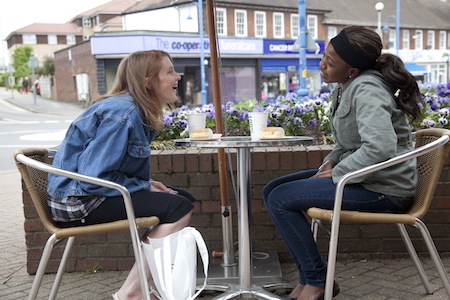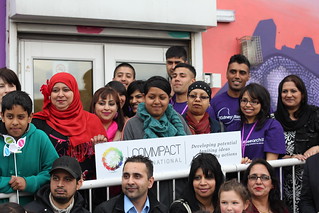When I asked my kids to tell me how they felt about visiting their grandma, who has dementia, in her care home, they were honest. “It can be a bit spooky because there are a lot of people there who can’t remember things,” said my eight-year-old. “It’s sad sometimes when we see her, especially when she says she thinks you’re her sister. I don’t really like hearing that. I remember when she was in her own house and she could make herself a cup of tea.”
Hard as it was to hear those words, I can’t say I find my daughter’s reaction surprising. I often find a visit to my mum “spooky” too. Although her care home is very good, it’s not somewhere I’d ever wanted her to be. It’s tough seeing her now, so different from the active person she once was, and the behaviour of people with dementia can be disconcerting and at times downright distressing. I initially found the resident who repeatedly cries out: “I feel terrible” very upsetting – and I’m supposed to be the adult.
The children and I have talked about how my mother used to be, why she gets confused now and why it’s so important that we spend the time that we do with her. My five-year-old summed it up well: “If we didn’t go, she’d be upset and she’s your mum.” But although we have often talked about dementia, and how it makes them feel, I’ve sometimes felt I was struggling to explain what was going on.
That’s why I was so impressed to find The Milk’s In The Oven, a booklet published by the Mental Health Foundation, to help children understand a bit more about dementia. Simply written, with practical exercises to encourage children to think about what it might be like to lose their memory, it’s an effective tool both for the classroom and for families affected by dementia.
Toby Williamson, head of development and later life at the Mental Health Foundation, explains that the booklet, originally published more than a decade ago but updated this autumn, is designed to help address some of the stigma surrounding dementia. “What we are trying to do is help young people understand what dementia is and how it affects the person,” he says. “It addresses the fears children might experience and the feelings they might have of being embarrassed or angry. What it is saying is actually you might well have those feelings, it’s understandable and you can talk about it. We want to reduce the fear of going to visit people with dementia. Social relationships are incredibly important for people with dementia – even in the final stages, a bit of contact, just holding hands, can mean so much.”
As Williamson points out, most families in the UK will, at some stage, have a relative or friend with dementia. It’s important, he stresses, that people know more about the disease, both so that they can support the person affected and so that they can encourage relatives to get an early diagnosis, often so valuable in terms of treatment and preparing for what’s ahead. And even for those children who don’t know anyone with dementia, there’s huge value in learning more about it.
Schools are increasingly teaming up with health professionals to build the links which can foster greater understanding. One impressive project is in Doncaster, where pupils from three schools now visit day centres across the town, taking part in activities like baking, sewing, singing and playing dominoes with people with dementia.
Mary Beardsley, the team manager for the local NHS trust’s Doncaster Community Memory Therapy Service says, the youngsters involved, who are aged between nine and 11, usually don’t have any personal experience of dementia. But thanks to the project they have built strong relationships with the service users, gaining a real respect for them as individuals. For the older people too, it’s been an overwhelmingly positive experience.
“Our patients gain so much confidence – it puts them in a position of power being able to teach the children something,” says Beardsley. “When you get dementia, you lose your confidence and you don’t think you are good enough. Seeing the interaction between children and patients is fantastic. The children grow to love them and the patients can’t wait for them to come.”
That recipe for a better understanding of dementia through building new relationships is one I can see developing in my own children. As they talk with some of the residents at my mum’s home, I hope they are seeing that older people with dementia need our support and respect. It’s a lesson that, as the numbers with dementia rise, more of the younger generation will need to learn.



